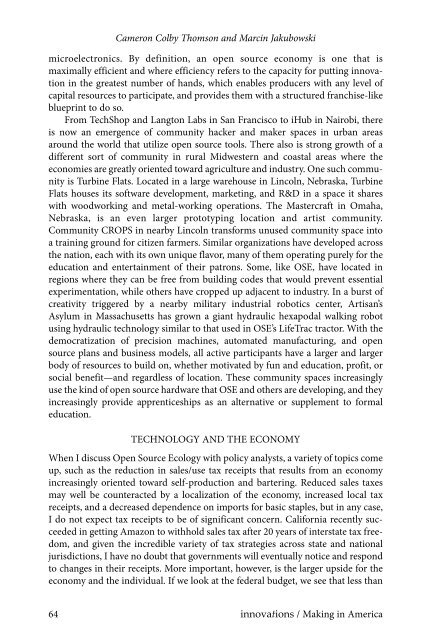Jakubowski-thomson
Jakubowski-thomson
Jakubowski-thomson
You also want an ePaper? Increase the reach of your titles
YUMPU automatically turns print PDFs into web optimized ePapers that Google loves.
Cameron Colby Thomson and Marcin <strong>Jakubowski</strong><br />
microelectronics. By definition, an open source economy is one that is<br />
maximally efficient and where efficiency refers to the capacity for putting innovation<br />
in the greatest number of hands, which enables producers with any level of<br />
capital resources to participate, and provides them with a structured franchise-like<br />
blueprint to do so.<br />
From TechShop and Langton Labs in San Francisco to iHub in Nairobi, there<br />
is now an emergence of community hacker and maker spaces in urban areas<br />
around the world that utilize open source tools. There also is strong growth of a<br />
different sort of community in rural Midwestern and coastal areas where the<br />
economies are greatly oriented toward agriculture and industry. One such community<br />
is Turbine Flats. Located in a large warehouse in Lincoln, Nebraska, Turbine<br />
Flats houses its software development, marketing, and R&D in a space it shares<br />
with woodworking and metal-working operations. The Mastercraft in Omaha,<br />
Nebraska, is an even larger prototyping location and artist community.<br />
Community CROPS in nearby Lincoln transforms unused community space into<br />
a training ground for citizen farmers. Similar organizations have developed across<br />
the nation, each with its own unique flavor, many of them operating purely for the<br />
education and entertainment of their patrons. Some, like OSE, have located in<br />
regions where they can be free from building codes that would prevent essential<br />
experimentation, while others have cropped up adjacent to industry. In a burst of<br />
creativity triggered by a nearby military industrial robotics center, Artisan’s<br />
Asylum in Massachusetts has grown a giant hydraulic hexapodal walking robot<br />
using hydraulic technology similar to that used in OSE’s LifeTrac tractor. With the<br />
democratization of precision machines, automated manufacturing, and open<br />
source plans and business models, all active participants have a larger and larger<br />
body of resources to build on, whether motivated by fun and education, profit, or<br />
social benefit—and regardless of location. These community spaces increasingly<br />
use the kind of open source hardware that OSE and others are developing, and they<br />
increasingly provide apprenticeships as an alternative or supplement to formal<br />
education.<br />
TECHNOLOGY AND THE ECONOMY<br />
When I discuss Open Source Ecology with policy analysts, a variety of topics come<br />
up, such as the reduction in sales/use tax receipts that results from an economy<br />
increasingly oriented toward self-production and bartering. Reduced sales taxes<br />
may well be counteracted by a localization of the economy, increased local tax<br />
receipts, and a decreased dependence on imports for basic staples, but in any case,<br />
I do not expect tax receipts to be of significant concern. California recently succeeded<br />
in getting Amazon to withhold sales tax after 20 years of interstate tax freedom,<br />
and given the incredible variety of tax strategies across state and national<br />
jurisdictions, I have no doubt that governments will eventually notice and respond<br />
to changes in their receipts. More important, however, is the larger upside for the<br />
economy and the individual. If we look at the federal budget, we see that less than<br />
64 innovations / Making in America


